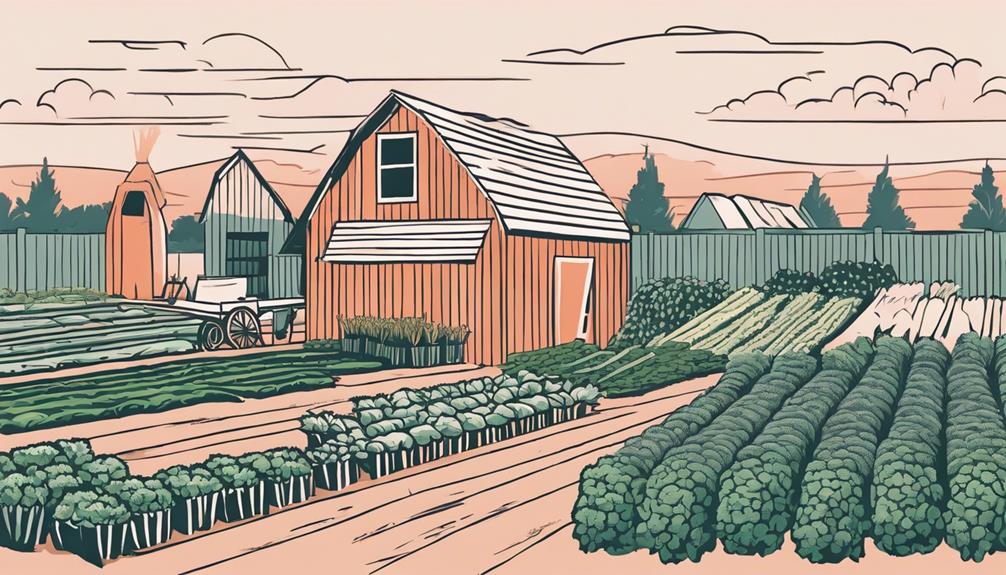See All: Backyard Farming
Free Backyard Farming Webinar…
You can grow food! This free webinar is for people who want the fastest and easiest ways to produce healthy and delicious vegetables, eggs, and meat. Because you know that growing your own food is like printing your own money…
Click Here To Watch The Free Webinar Now!
“Hi, I live in the countryside and have recently started a backyard farm. With winter approaching, I’m not sure what crops would thrive in the colder months. I’m looking for advice on the best winter crops to grow. What are some choices that would do well despite the frost and shorter days?”
Thanks,
Susan, Vermont, USA.
What Are The Best Winter Crops?
Winter gardening might sound daunting, but it’s actually a fantastic way to keep your backyard farm productive year-round. With the right crops and a little bit of planning, you can enjoy fresh, homegrown produce even during the coldest months. Let’s explore some of the best winter crops that will thrive in your backyard and help you make the most of your garden space.
Why Grow Winter Crops?
One might wonder about the benefits of winter gardening. Here’s why it is worth considering:
- Extended growing season: Winter crops provide fresh produce all year, making your backyard farm productive beyond just the warm weather months.
- Healthy eating: Growing your own vegetables means you have access to fresh, nutritious food that’s not only tastier but also free from chemicals.
- Soil improvement: Planting cover crops during the winter helps prevent soil erosion, add nutrients back into the soil, and prepare for next season’s crops.
Top Winter Crops for Home Gardeners
Now, let’s look at some of the best winter crops you can grow, Susan. These are perfect for colder climates and will fill your table with homegrown goodness:
Kale
Kale is one of the toughest winter vegetables around. It can handle frost and even benefit from it, as cold weather can make the leaves sweeter.
- Varieties: Try ‘Winterbor’ or ‘Red Russian’ for great cold tolerance.
- Planting: Plant kale 6-8 weeks before the first frost date and add a layer of mulch to protect the roots.
- Harvesting: You can harvest the outer leaves as needed, leaving the center to continue growing.
Garlic
Garlic is a must-have for any backyard farm. It’s easy to grow and has numerous culinary uses.
- Varieties: ‘Hardneck’ varieties like ‘Rocambole’ are perfect for cold climates.
- Planting: Plant garlic in late fall, before the ground freezes. Space cloves about 6 inches apart and cover them with soil and mulch.
- Harvesting: Garlic will be ready to harvest in late spring or early summer.
Brussels Sprouts
Brussels sprouts are slow-growing but incredibly hardy, making them ideal winter crops.
- Varieties: ‘Long Island Improved’ is a reliable choice.
- Planting: Plant them in late summer to allow enough time before heavy frosts.
- Harvesting: Wait until after a few frosts to harvest, as the cold improves their flavor.
Carrots
Carrots thrive in cooler temperatures, and their flavor also sweetens after a few frosts.
- Varieties: ‘Nantes’ and ‘Imperator’ are excellent winter varieties.
- Planting: Sow carrot seeds directly in the garden in late summer to early fall.
- Harvesting: Mulch them heavily to protect from freezing, and harvest throughout the winter as needed.
Spinach
Spinach is another frost-tolerant leafy green that grows well in colder weather.
- Varieties: ‘Bloomsdale’ and ‘Giant Winter’ are well-suited for winter growing.
- Planting: Sow seeds directly in the ground 6-8 weeks before the first frost.
- Harvesting: Harvest outer leaves regularly; the plant will continue to produce more.
Additional Tips for Winter Gardening
To ensure your winter garden is a success, keep these tips in mind:
Protecting Your Plants
Using row covers, cold frames, or even greenhouse tunnels can provide that little extra warmth and protection from harsh winds and frost.
Mulching
Applying a thick layer of mulch around your plants’ bases can insulate the roots and prevent the soil from freezing.
Watering Wisely
Even though it’s cold, your plants will still need water. Water them during the warmest part of the day so the water can soak in before it freezes overnight.
Pest Management
While pests are generally less active in winter, you should still keep an eye out for any unwanted visitors. Using organic methods like neem oil or insecticidal soap can help if you notice any pests.
Soil Preparation
Winter crops can be demanding on the soil, so consider planting a cover crop or adding compost in the spring to replenish nutrients.
Succession Planting
Stagger your plantings. For example, plant a row of spinach, then wait a couple of weeks and plant another row. This guarantees a continuous harvest.
Caring for the Soil
Winter crops tend to be heavy feeders. Therefore, it’s crucial to fortify your soil by adding compost or well-rotted manure before planting. This not only improves soil health but also provides the necessary nutrients for your crops to thrive.
Final Thoughts…
Susan, winter gardening opens up a whole new range of possibilities for your backyard farm. From hardy greens like kale and spinach to root vegetables like carrots, there’s plenty you can grow to keep your kitchen stocked with fresh produce even in the colder months. Adopt some extra measures such as mulching and using row covers, and you’ll find winter gardening both rewarding and enjoyable.
Thank you for sending your question from Vermont, Susan. Embrace the cold months and watch your garden flourish!
Return To: Backyard Farming
Free Backyard Farming Webinar…
Marjory Wildcraft: For 20+ years, Marjory has been a leader in survival & preparedness and wants to show you how to grow food in your backyard farm. This free webinar is for people who want the fastest and easiest ways to produce healthy and delicious vegetables, eggs, and meat. Because you know that growing your own food is like printing your own money…

